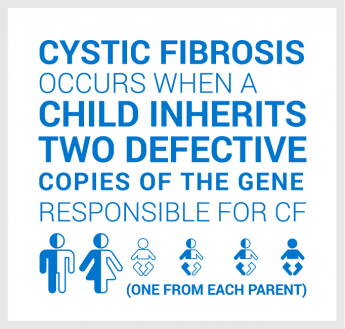Q&A with Dr. Michael Surette
Dr. Michael Surette is a Cystic Fibrosis Canada funded-researcher, Professor and Research Chair in Interdisciplinary Microbiome Research at the Farncombe Family Digestive Health Research Institute, Faculty of Health Sciences, McMaster University.
How did you become involved in cystic fibrosis research and what do you enjoy most about your work?
My initial foray into cystic fibrosis microbiology came about largely through my having the opportunity to work with Dr. Harvey Rabin (head of the Calgary Adult CF Clinic) when I was an Assistant Professor at the University of Calgary. Harvey educated me about CF and the unanswered questions about the microbiology of airway infections. It was clear there was a research problem there for us to investigate.
From the very beginning, our research in CF has been a team effort and we worked closely with the clinical team. It has been a great pleasure to work with everyone, and all of them have contributed to our research. Of course the patients have also been very supportive and it has been very fulfilling getting to know and work with them. They have been such an inspiration to the lab and they are the reason we do this work.
Why is your research important for people with cystic fibrosis?
Pulmonary exacerbations and the irreversible lung damage they cause are responsible for most of the loss of lung function in patients. These are driven primarily by bacterial infections and the pathogens we are all familiar with (such as Pseudomonas, Staphylococcus and Burkholderia). But it was clear from the data that Dr. Rabin had collected over the years and from his clinical observations that these organisms did not explain all of the exacerbations.
Our CF research is simply to try to understand what causes exacerbations in each patient. This has led us to identify new pathogens (sometimes quite common) that have been previously missed, and has allowed for more effective treatment in some patients. Over the last decade or so, we and others have changed the view of CF microbiology from the lungs being infected by one or two of the traditional CF pathogens, to the understanding that the lower lungs are, in fact, colonized by many different species of bacteria. How these different bacteria interact to promote exacerbations is one of our main areas of CF research.
In the case of CF patients, bacterial infections can cause irreversible damage to the lungs, ultimately leading to death. Can you describe how your research is committed to finding ways to control lung infection in CF patients where the most dramatic lung damage occurs?
Effective antibiotic treatment and airway clearance (which also reduces bacterial burden in the airways) are responsible for most of the improvements in CF disease management over the last few decades. Treating the primary pathogens is still critical, however, when other pathogens are involved, we can use antibiotics more effective against them. Similarly, there are cases where antibiotics directed against bacteria other than the usual suspects may show great benefit.
How is your research advancing treatment options and enhancing the quality of life for CF patients?
The goal of our research is to have a personalized medicine approach to managing infectious exacerbations in CF patients- using the most effective therapy for each patient to reduce the frequency and duration of these events.
What are your recent findings to share with the CF community? What are the next steps in your current research in developing new therapies?
In recent years we have seen very dramatic changes in DNA sequencing and other technologies that should translate into more accurate and comprehensive microbiology in CF. However there are limitations and challenges to realizing this. One need is a better understanding of the spectrum of organisms that cause exacerbations. This would allow us to use currently available antibiotics more effectively. Another area of interest is to study interactions between bacteria to control infections and predict susceptibilities to CF pathogens.
What is needed to help Canadian researchers find a cure for cystic fibrosis?
Basic research into the fundamental defects in the CFTR gene has led to the new classes of drugs (correctors and potentiators) that are showing dramatic results in some groups of patients. At least in the foreseeable future, this will be the closest to a cure. However, these drugs will not eliminate the complications of CF. Airway infections will continue to be an issue for many CF patients. These new drugs will not be effective for patients with less common CFTR mutations. Older patients will already have significant airway disease and will be vulnerable to infections, and perhaps a new spectrum of pathogens will emerge in these newly treated patient populations. These are exciting times, but there is still a need for basic research in all aspects of CF disease.





